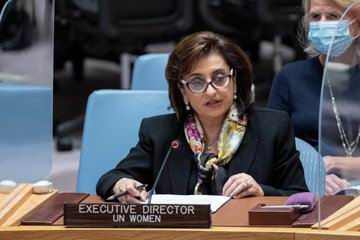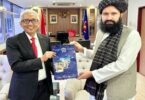KABUL (Khaama Press): On Tuesday, the UN’s lead organization for promoting gender equality urged the international community to advocate for change in Afghanistan persistently. The agency emphasized the urgent need to address the extensive and unprecedented restrictions imposed on the rights of women and girls throughout the country.
Sima Bahous, the Executive Director of UN Women, issued the plea in a statement commemorating the second anniversary of the Taliban’s resurgence to power in the country.
“It is now two years since the Taliban took control of Afghanistan, during which time it has imposed the most comprehensive, systematic, and unparalleled assault on the rights of women and girls, Sima Bahous said. She continued, “Through over 50 edicts, orders, and restrictions, the Taliban has left no aspect of women’s lives untouched, no freedom spared. They have created a system founded on the mass oppression of women that is rightly and widely considered gender apartheid.”
“I urge the Taliban to reconsider and to weigh the cost of these acts for Afghanistan’s present and future,” Bahous added.
Bahous emphasized UN Women’s solid and unwavering commitment to the betterment and empowerment of women and girls within the nation.
She said the agency’s work there is anchored in its fundamental relationships with women, who have described how these “misguided, cruel and ultimately self-defeating” measures have affected their lives. “Despite these challenges, Afghan women also tell me they will not give up or give in. They will continue to lead the struggle against their oppression,” she said.
“In the face of the most hostile circumstances, they speak out against the violations, deliver lifesaving services, own and operate businesses, and run women’s organizations. Their bravery must inspire us to greater action, their example to renewed determination,” Bahous said.
“I urge the international community to continue to apply every pressure and employ every means at their disposal to press for change, including by answering the call of the humanitarian community and fully funding the humanitarian appeal for Afghanistan,” she said.
During the occasion, Volker Turk, the UN Human Rights High Commissioner, took the opportunity to underscore the responsibility of the de facto authorities in upholding the rights of all individuals, including women and girls.
UN human rights personnel remain in Afghanistan, actively supervising, documenting, and advocating for various human rights concerns. These span from fundamental freedoms to the protection of civilians during conflicts and the preservation of the rights of detainees.
Liz Throssell, a spokesperson for the UN Human Rights Office (OHCHR) in Geneva, stated, “We are engaging with the de facto authorities on these issues and remind them of their obligations under international human rights law.”
The High Commissioner strongly emphasized the necessity for the international community to sustain its awareness of the difficulties confronting the Afghanistan people.







